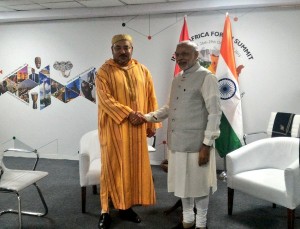Times of India
Blogs
Rudroneel Ghosh in Talking Turkey
Through yet another significant foreign visit, Morocco’s King Mohammed VI has enhanced the North African nation’s ties with China. The monarch and Chinese President Xi Jinping inked a joint statement on establishing strategic ties between the two countries and oversaw the signing of 15 bilateral agreements and MoUs. The latter cover a vast range of sectors such as tourism, infrastructure building, legal matters, cooperation in railways and
mining, etc. China is well aware of Morocco’s strategic importance as a country that sits on the crossroads of Africa – especially Francophone Africa – and the Arab World. And given the increasing isolationist tendency gripping the US, these are regions where China would like to further boost its presence.
Of course, there’s a significant difference between American and Chinese influence and the form that these two take. While the impulse to export democracy and support referendums has always been a part of the US strategic outreach, over the years a perception has formed that Washington applies this principle selectively and according to its own convenience. In contrast, China promises to work constructively with foreign governments in a consistent fashion. And as far as Morocco is concerned, China has affirmed the principle of respecting sovereignty and territorial integrity – a key point for Rabat in the context of the Moroccan Sahara issue.
Meanwhile, from Morocco’s point of view the outreach to China is crucial in the context of the current geopolitical climate. King Mohammed is directing a robust foreign policy that seeks to bestow Morocco with strategic flexibility. For Rabat has realised that in an increasingly multipolar world where new alliances, blocs and partnerships are being formed at a rapid pace, it needs to retain the ability to touch different poles as and when required. It simply cannot be held hostage to past compacts, especially when these are being used to keep Morocco in check.
It’s in this context that King Mohammed declared in his speech to the Gulf Cooperation Council last month that Morocco was looking forward to launching strategic partnerships with China and India. The China part has now materialised. It’s hoped that the India-Morocco strategic partnership will follow. Needless to say, this will be a win-win compact given that both countries share common interests in ensuring regional stability, fighting radicalism, and harnessing the opportunities that new technology affords in improving the quality of life of the people. Synergy also exists in key functional areas such as promoting renewable energy and fighting climate change – Morocco, in fact, is hosting the next UN climate summit in Marrakech in November.
Add to this the fact that Morocco can be a vital entry point for Indian investments in Africa’s Sahara and Sahel regions. Taken together, a strategic partnership between New Delhi and Rabat makes sense. In this regard, the visit of Vice-President Hamid Ansari to Morocco starting May 30 is important. It could serve as a vital platform for not just Prime Minister Narendra Modi’s expected visit to Marrakech in November but also King Mohammed’s possible visit to India in future.
Author
Rudroneel Ghosh
I am a Delhi-based journalist working for the Edit Page of The Times of India.








